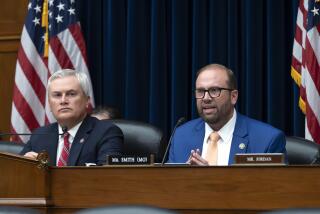Top Republican decries ‘partisan environment’ of financial crisis inquiry
Reporting from Washington — The federal commission that investigated the financial crisis descended into partisanship, with its Democratic majority pushing to find “villains and victims” rather than the true causes, according to the panel’s top Republican.
“It was clear from the beginning it was a partisan environment,” former Bakersfield Rep. Bill Thomas told the House Financial Services Committee on Wednesday, noting that with six Democrats and four Republicans on the panel, “the math is simple.”
But the chairman of the Financial Crisis Inquiry Commission, Democrat Phil Angelides, also of California, defended the 525-page report released last month. Only Democrats supported the panel’s majority findings, which cast blame widely among regulators, corporate executives and consumers for a crisis deemed avoidable.
“The facts have not been challenged,” said Angelides, a former California treasurer. “Everyone can draw their own conclusions.”
“But we were looking to you for the conclusions,” said Rep. Scott Garrett (R-N.J.).
Republicans on the House committee blasted the panel for not reaching consensus the way that the commission that investigated the September 2001 terrorist attacks did.
“It’s sad that important work is hard to take seriously when it was conducted on a partisan basis,” said Rep. Jeb Hensarling (R-Texas).
Republicans also criticized Democrats in Congress for passing an overhaul of financial rules last year before the commission even issued its report. Democrats on the committee generally praised the commission’s work.
Committee Democrats, too, were disappointed about the lack of bipartisanship, but they supported the majority report. “I thought it was an excellent report,” said Rep. Carolyn Maloney (D-N.Y.)
Rep. Stephen Lynch (D-Mass.) praised it “for its honesty and clarity and for the ease of which it explains some very difficult and complex financial issues.”
Although Angelides and Thomas had a long history as aggressive partisans, they began their work in mid-2009 saying they wanted to emulate the bipartisanship of the 9/11 commission. That panel, which was split evenly among Republicans and Democrats, produced a widely praised report that became a bestseller for its compelling narrative of the events leading up to the attacks.
Angelides said the financial crisis panel’s report was selling well and could hit No. 10 on the New York Times’ nonfiction bestseller list this weekend.
“We were true to our charge and we fulfilled our mandates,” he said.
But it was clear in the commission’s final report that bipartisanship had broken down.
Thomas joined two other Republicans in one dissent that said the crisis was an unavoidable result of global economic factors. The fourth Republican, Peter Wallison, wrote his own dissent, blaming government intervention in the housing market.
Thomas said the problems began when the Democratic-controlled Congress created a stacked panel.
“I think we had the money, the time, the staff and the resources necessary for our work to have been a success,” he said.
“I believe this disappointing result was as much a product of the political motivation in our creation as it was an inability to reach agreement on substantive issues. But when you have the votes, what else really matters?” he said.
More to Read
Inside the business of entertainment
The Wide Shot brings you news, analysis and insights on everything from streaming wars to production — and what it all means for the future.
You may occasionally receive promotional content from the Los Angeles Times.










